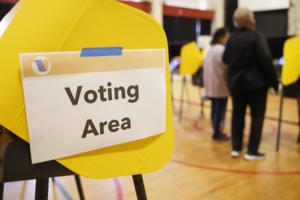Politics
/ArcaMax

Steve Lopez: My toothache led to a painful discovery: The dental care system is full of cavities as you age
I had a nagging toothache recently, and it led to an even more painful revelation.
If you X-rayed the state of oral health care in the United States, particularly for people 65 and older, the picture would be full of cavities.
"It's probably worse than you can even imagine," said Elizabeth Mertz, a UC San Francisco professor and Healthforce ...Read more

George Skelton: Scary time for California Democrats
SACRAMENTO, Calif. — The race for California governor couldn’t be much closer. And that’s scary for Democrats.
Only the top two vote-getters in the June 2 primary — regardless of their party — will advance to the November election. And although still unlikely, it’s increasingly conceivable that both could be Republicans.
“Scare ...Read more

Leonard Greene: Mamdani on wrong side of 'snowball fight' with police
NEW YORK — If this city was like it used to be, like it’s supposed to be, then the fracas that erupted in Washington Square Park last week would have been nothing more than the simple snowball fight that Mayor Zohran Mamdani said it was.
But it wasn’t.
Because if what happened in Washington Square Park had been a simple snowball fight ...Read more

Mark Z. Barabak: With midterm vote starting, here's where things stand in national redistricting fight
Donald Trump has never been one to play by the rules.
Whether it's stiffing contractors as a real estate developer, defying court orders he doesn't like as president or leveraging the Oval Office to vastly inflate his family's fortune, Trump's guiding principle can be distilled to a simple, unswerving calculation: What's in it for me?
Trump is...Read more

Robin Abcarian: Gavin Newsom is a lot more complicated than you think
One thing you can say for California Gov. Gavin Newsom: He's not afraid to tick people off.
In 2004, as mayor of San Francisco, he defied the law and ordered that gay couples be allowed to marry. The move, he was told, was a career ender. He did it anyway.
In 2013, as lieutenant governor under then-Gov. Jerry Brown, Newsom took the occasion of...Read more
Trudy Rubin: Forget State of the Union sideshow, MAGA's real chilling message was delivered by Marco Rubio in Munich
As a matter of journalistic duty, I forced myself to watch the endless State of the Union reality show.
Punting on all serious issues, President Donald Trump stoked the applause meter by delivering awards to a 100-year-old vet and a brave U.S. pilot, and inviting the entire U.S. men’s Olympic hockey team to celebrate their gold medal win.
...Read more

Editorial: We won't miss the Supreme Leader of Iran. But does Donald Trump have a real plan?
Retirement experts note the folly of retiring from something, which drives what most people do, and the wisdom of retiring to something, a rarer but far superior choice.
The analogy holds when it comes to what just happened this weekend in Iran.
Especially if you look at what took place in Venezuela, the previous example of Donald Trump-led ...Read more

Commentary: Killing an enemy leader often escalates conflict and chaos
The U.S. and Israel gambled on “decapitation” in Iran, killing Supreme Leader Ayatollah Ali Khamenei and many others. History shows the danger of this approach in nationalist conflicts: It often works tactically — and fails strategically.
Although the weekend’s “shock and awe” bombing campaign and the U.S.-led regime change remind ...Read more
Editorial: A better future for Iran: The death of Ayatollah Khamenei and the promise of freedom
The death of the medieval theocratic dictator of Iran, Ayatollah Khamenei — a diabolical fanatic who pursued nuclear weapons — is a moment of celebration that after 47 years of internal tyranny and oppression and external terrorism and war, freedom may finally be at hand for the people of Iran and peace for their Mideast neighbors, Arabs and...Read more
Andreas Kluth: The Iran strikes feel like 2003 all over again
Less than a year ago, President Donald Trump gave a speech in the Middle East in which he excoriated his predecessors for their habit of launching “forever wars” in that region. Alluding to the American invasion of Iraq in 2003 in particular, he accused them of “intervening in complex societies that they did not even understand themselves,...Read more
Ronald Brownstein: If the Iran strikes backfire, voters will know who's to blame
President Donald Trump begins his conflict with Iran on a narrow ledge in public opinion. So long as the mission’s costs to America remain small, he’s unlikely to face insurmountable political pressure to end it. But he starts the war extraordinarily vulnerable to backlash if things go wrong.
Polls show that most Americans do consider the ...Read more
Noah Feldman: Decades of presidents ignoring the War Powers Act led us here
When you bomb a country and take out its leader, that’s an act of war.
Under the Constitution, Congress must declare war or otherwise authorize the use of force before the president may take such action. It doesn’t matter whether it’s Iran, where the joint U.S.-Israeli attacks that killed Supreme Leader Ali Khamenei have already led to ...Read more
Editorial: Trump wants Iranians to rise up -- will they?
Celebrations broke out across Iran in the wake of U.S. and Israeli strikes over the weekend that killed the country’s supreme leader, Ali Khamenei, and other top officials. President Donald Trump urged the nation’s people to seize the opportunity. “The hour of your freedom is at hand,” he said. “When we are finished, take over your ...Read more

Commentary: American energy policy is a bipartisan issue
The energy policy choices our nation makes today are among the most important and far-reaching policy decisions we will make in the 21 st century.
U.S. oil production reached a record high last year. If we are to continue our nation’s positive energy trends, we must implement energy policies based on current reality and our potential as an ...Read more

Commentary: Crunching the numbers on the affordability crisis
The word that seems to concern many people today is “affordability.” Whether one is purchasing a home, buying food or paying doctors’ bills, everything seems more expensive. And the fact is, everything is more expensive.
The consumer price index in December 2021 stood at 278. By December 2025, it had reached 324 — an increase of 16.5 ...Read more

Commentary: East Wing's demolition highlights US construction waste problem
Last December, the National Trust for Historic Preservation in the United States filed a lawsuit against the Trump administration for demolishing the East Wing of the White House for Trump’s $300 million ballroom.
While the destruction alarmed historians and preservationists, angered political opponents, and may prove illegal, it’s also ...Read more

Commentary: Lessons about community over coffee
Much of what I know and practice I have learned at a Starbucks. For me, it is where community and connection are as steady as and unique as a craft beverage.
Not long ago, I thought of Robert Fulghum's "All I really need to know I learned in kindergarten." Fulghum’s main idea was clear: The same rules that help kids get along, like playing ...Read more

Mark Gongloff: El Niño is returning with another stark warning
A science-fiction trope is the time traveler who visits the present day with a dire warning about the future only to be tragically ignored. It resonates because it’s so believable. In fact, Earth had just such a visitor recently, and we dismissed it completely.
Three years ago, scientists warned that an approaching El Niño in the Pacific ...Read more

Commentary: Trump's retirement proposal already failed -- under Obama
In his State of the Union address, the president announced a new type of government retirement account designed for Americans who don’t have access to one. Whether he can make good on this promise remains to be seen, given the likely need for legislative approval from a deeply divided Congress in an election year.
Donald Trump in 2026? Try ...Read more

Lisa Jarvis: What adults get wrong about girls and autism
For decades, autism was believed to overwhelmingly affect boys. Yet a big new study out of Sweden provides perhaps the best evidence yet that girls aren’t less likely to be autistic — they’re just less likely to be diagnosed young.
Researchers looked across 35 years of health records for nearly 2.8 million people (an incredibly complete ...Read more




















































